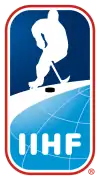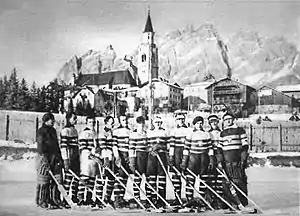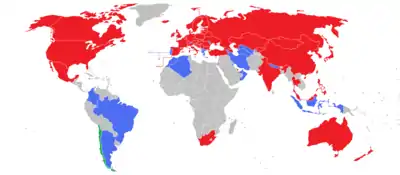International Ice Hockey Federation
The International Ice Hockey Federation (IIHF; French: Fédération internationale de hockey sur glace; German: Internationale Eishockey-Föderation) is a worldwide governing body for ice hockey and in-line hockey. It is based in Zurich, Switzerland, and has 81 member countries. Over two thirds of registered members are North-American.
Fédération internationale de hockey sur glace Internationale Eishockey-Föderation | |
 | |
| Abbreviation | IIHF |
|---|---|
| Formation | 15 May 1908 |
| Founded at | Paris, France |
| Type | Sports federation |
| Headquarters | Zurich, Switzerland |
Membership | 81 members |
Official language | English French German |
| René Fasel | |
| Website | www |
The IIHF maintains the IIHF World Ranking based on international ice hockey tournaments. Rules of play for IIHF events differ from hockey in North America and the rules of the National Hockey League (NHL). Decisions of the IIHF can be appealed through the Court of Arbitration for Sport in Lausanne, Switzerland. The IIHF maintains its own hall of fame for international ice hockey. The IIHF Hall of Fame was founded in 1997, and has been located within the Hockey Hall of Fame since 1998.
Functions

The main functions of the IIHF are to govern, develop and organize hockey throughout the world. Another duty is to promote friendly relations among the member national associations and to operate in an organized manner for the good order of the sport.[1] The federation may take the necessary measures in order to conduct itself and its affairs in accordance with its statutes, bylaws and regulations as well as in holding a clear jurisdiction with regards to ice hockey and in-line hockey at the international level. The IIHF is the body responsible with arranging the sponsorships, license rights, advertising and merchandising in connection with all IIHF competitions.
Another purpose of the federation is to provide aid in the young players' development and in the development of coaches and game officials. On the other hand, all the events of IIHF are organized by the federation along with establishing and maintaining contact with any other sport federations or sport groups. The IIHF is responsible for processing the international players' transfers. It is also the body that presides over ice hockey at the Olympic Games as well as over all levels of the IIHF World Championships.[2] The federation works in collaboration with local committees when organizing its 25 World Championships, at five different categories.
Even though the IIHF runs the world championships, it is also responsible for the organization of several European club competitions such as the Champions Hockey League or the Continental Cup.
The federation is governed by the legislative body of the IIHF which is the General Congress along with the executive body, which is the Council. The Congress is entitled to make decisions with regard to the game's rules, the statutes and bylaws in the name of the federation. It is also the body that elects the president and the council or otherwise known as board.[3] The president of the IIHF is basically the representative of the federation. He represents the federation's interests in all external matters and he is also responsible that the decisions are made according to the federation's statutes and regulations. The president is assisted by the General Secretary, who is also the highest ranked employee of the IIHF.
History
The International Ice Hockey Federation was founded on 15 May 1908 at 34 Rue de Provence in Paris, France, as Ligue Internationale de Hockey sur Glace (LIHG).[4] The 1920 Olympics were the first to integrate hockey into their program.

The 1928 Winter Olympics, which also served as the World and European Championship for the year, saw a record 11 countries participate.[5] The 1936 Winter Olympics set a new record with 15 participants.
The Hungarian Revolution of 1956 which had caused Hungary to be occupied by the Soviet Army, led to a boycott of the 1957 World Championships, which were being staged in Moscow. Canada and the United States led the boycott, and were joined by Norway, West Germany, Italy, and Switzerland.[6]
The 1962 World Championship, hosted by the American cities of Colorado Springs and Denver, was boycotted by the Soviet Union and Czechoslovakia, which led to a further boycott by the other Eastern Bloc countries. At issue was the boycott of the 1957 championships in Moscow by Canada and the United States, and the Americans refusal of East German passports in reaction to the building of the Berlin Wall by East Germany.[7]
For the 1965–66 season, the IIHF created the European Cup, a tournament consisting of the top club teams from around Europe. The competition was originated by Günther Sabetzki, based on the Association football European Cup (now UEFA Champions League). In 1968 the IIHF organized the European U19 Championship, a junior competition for players aged 19 and under. The age limit was later reduced to 18 in 1977.[6]
During the 1980s Canada stopped boycotting the World Championships and Olympic Games. The Canadians had boycotted these tournaments between 1970 and 1976 after the IIHF had refused to allow them to roster professional players at the World Championships from NHL teams that had not qualified for the Stanley Cup playoffs. President Sabetzki managed to find a compromise that resulted in the return of Canada to international events beginning in 1977. The pro players whose teams had been eliminated from the playoffs were allowed to compete and in exchange, Canada agreed to participate in the World Championships. They also waived their right to host any World Championships. The creation of the Canada Cup (a competition organized by the NHL in Canada every four years) was also part of the new agreement between the IIHF and North American professional hockey.[7]
The IIHF continued to grow in numbers during the 1980s and 1990s, both due to political events and the continued growth of hockey worldwide. The dissolution of the Soviet Union saw its membership transferred to Russia, and the addition of four ex-Soviet republics; Azerbaijan, Belarus, Kazakhstan, and Ukraine to the federation. In addition, the memberships of Estonia, Latvia, and Lithuania - all of which had initially joined the IIHF in the 1930s but were expelled following their annexation by the Soviet Union - were renewed. The breakup of Yugoslavia also resulted in an increase in membership. Croatia and Slovenia joined as new members, while the membership of the old Yugoslavia was transferred to FR Yugoslavia (which later became known as Serbia and Montenegro and still later dissolved into the independent republics of Serbia and Montenegro). When Czechoslovakia broke up, its membership rights were transferred to the Czech Republic and Slovakia was admitted as a new member. The influx of new members resulted in the IIHF increasing the size of the Group A tournament. It expanded from 8 teams to 12 in 1992 and from 12 to 16 in 1998.[8]
IIHF Hall of Fame

Prior to the establishment of the IIHF Hall of Fame, the IIHF displayed a collection of historical artifacts from World Championships and the Olympic Games in temporary exhibits. From 1992 to 1997, the IIHF loaned its exhibits to the International Hockey Hall of Fame in Kingston, Ontario, Canada.[9]
The first step taken by the IIHF to create its own hall of fame was a proposal made in 1996, which was later ratified at the 1997 IIHF summer congress to host the museum in Zürich.[9] The approval came exactly 89 years from the foundation of the IIHF, with the purpose of honoring former international ice hockey players, builders (administrators) and officials.[10] The annual induction ceremony takes place on the medal presentation day of the Ice Hockey World Championships.[9][10] The IIHF agreed with the National Hockey League to transfer its exhibits to the Hockey Hall of Fame in Toronto, Canada, as of 29 July 1998.[9]
Tournaments
Current title holders
| Tournament | World Champion | Year |
|---|---|---|
| Men | 2019 | |
| U-20 Men | 2021 | |
| U-18 Men | 2019 | |
| Women | 2019 | |
| U-18 Women | 2020 |
Other national team tournaments
- NHL participation
- Ice hockey at the Olympic Games (1998–2014)
- Canada Cup–An NHL-sanctioned tournament played between professional players from the top teams in the world five times between 1976 and 1991.[11]
- World Cup of Hockey–The successor to the Canada Cup, played in 1996, 2004 and 2016.[11][12]
- Summit Series–The series played between Canada and the Soviet Union in 1972.[13]
- Other
- Ice Hockey European Championships–An annual ice hockey tournament for European countries associated to the International Ice Hockey Federation played from 1910 to 1991.
Staff
The IIHF is a relatively small organization, with about twenty members of staff employed at the headquarters in Zurich.[14]
Presidents

| Name | Years |
|---|---|
| 1908–1912 | |
| 1912–1914 | |
| 1914 | |
| 1914 | |
| 1914–1920 | |
| 1920–1922 | |
| 1922–1947 | |
| 1947–1948 | |
| 1948–1951 | |
| 1951–1954 | |
| 1954–1957 | |
| 1957–1960 | |
| 1960–1963 | |
| 1963–1966 | |
| 1966–1969 | |
| 1969–1975 | |
| 1975–1994 | |
| 1994–present |
Chief Medical Officers
- Wolf-Dieter Montag, Germany (1975 to 1998)[15]
- Mark Aubry, Canada (1998 to present)[16][17]
Members
The federation has 59 full members: Australia, Austria, Azerbaijan, Belarus, Belgium, Bosnia and Herzegovina, Bulgaria, Canada, China, Chinese Taipei, Croatia, the Czech Republic, Denmark, Estonia, Finland, France, Georgia, Germany, Great Britain, Hong Kong, Hungary, Iceland, India, Ireland, Israel, Italy, Japan, Kazakhstan, North Korea, South Korea, Kuwait, Kyrgyzstan, Latvia, Lithuania, Luxembourg, Malaysia, Mexico, Mongolia, Netherlands, New Zealand, Norway, the Philippines, Poland, Qatar, Romania, Russia, Serbia, Slovakia, Slovenia, South Africa, Spain, Sweden, Switzerland, Thailand, Turkey, Turkmenistan, Ukraine, the United Arab Emirates, and the United States. Full members have a national body dedicated to the sport, and participate annually in the international championships. Only full members have voting rights.
In addition, there are 21 associate members and one affiliate member.
Associate members either do not have a national body dedicated to the sport, or do not regularly participate in the international championships. They are Algeria, Andorra, Argentina, Armenia, Brazil, Colombia, Greece, Indonesia, Iran, Jamaica, Lebanon, Liechtenstein, Macau, Moldova, Morocco, Nepal, North Macedonia, Oman, Portugal, Singapore, and Uzbekistan.
Chile, an affiliate member, only participate in inline championships.
Registered players
Based on the number of registered ice hockey players, including male, female and junior, provided by the respective countries' federations. Note that this list includes 67 out of 76 IIHF member countries with more than 100 registered players as of April 2019.[18][19]
| Country | Registered players | % of registered players | % of population |
|---|---|---|---|
| 637,000 | 35.64% | 1.709% | |
| 562,145 | 31.45% | 0.171% | |
| 120,920 | 6.76% | 1.137% | |
| 110,624 | 6.19% | 0.077% | |
| 73,374 | 4.10% | 1.319% | |
| 62,701 | 3.51% | 0.624% | |
| 27,528 | 1.54% | 0.320% | |
| 21,667 | 1.21% | 0.033% | |
| 20,938 | 1.17% | 0.025% | |
| 18,765 | 1.05% | 0.015% | |
| 10,727 | 0.60% | 0.197% | |
| 9,572 | 0.54% | 0.177% | |
| 8,634 | 0.48% | 0.098% | |
| 8,162 | 0.46% | 0.012% | |
| 7,000 | 0.39% | 0.366% | |
| 6,478 | 0.36% | 0.035% | |
| 5,895 | 0.33% | 0.013% | |
| 5,889 | 0.33% | 0.061% | |
| 5,370 | 0.30% | 0.057% | |
| 5,358 | 0.30% | 0.009% | |
| 4,905 | 0.27% | 0.085% | |
| 4,465 | 0.25% | 0.018% | |
| 4,232 | 0.24% | 0.025% | |
| 3,600 | 0.20% | 0.009% | |
| 3,052 | 0.17% | 0.006% | |
| 2,764 | 0.15% | 0.000% | |
| 2,466 | 0.14% | 0.086% | |
| 2,421 | 0.14% | 0.021% | |
| 2,300 | 0.13% | 0.009% | |
| 2,000 | 0.11% | 0.011% | |
| 1,838 | 0.10% | 0.021% | |
| 1,562 | 0.09% | 0.008% | |
| 1,552 | 0.09% | 0.001% | |
| 1,524 | 0.09% | 0.020% | |
| 1,330 | 0.07% | 0.028% | |
| 1,293 | 0.07% | 0.000% | |
| 1,196 | 0.07% | 0.001% | |
| 1,114 | 0.06% | 0.054% | |
| 1,080 | 0.06% | 0.002% | |
| 1,060 | 0.06% | 0.002% | |
| 1,043 | 0.06% | 0.080% | |
| 1,015 | 0.06% | 0.004% | |
| 929 | 0.05% | 0.013% | |
| 915 | 0.05% | 0.015% | |
| 766 | 0.04% | 0.001% | |
| 730 | 0.04% | 0.023% | |
| 649 | 0.04% | 0.017% | |
| 646 | 0.04% | 0.007% | |
| 600 | 0.03% | 0.014% | |
| 566 | 0.03% | 0.166% | |
| 563 | 0.03% | 0.006% | |
| 533 | 0.03% | 0.009% | |
| 530 | 0.03% | 0.012% | |
| 432 | 0.02% | 0.072% | |
| 367 | 0.02% | 0.001% | |
| 359 | 0.02% | 0.001% | |
| 354 | 0.02% | 0.006% | |
| 330 | 0.02% | 0.000% | |
| 326 | 0.02% | 0.007% | |
| 289 | 0.02% | 0.010% | |
| 225 | 0.01% | 0.001% | |
| 200 | 0.01% | 0.002% | |
| 187 | 0.01% | 0.005% | |
| 141 | 0.01% | 0.000% | |
| 131 | 0.01% | 0.000% | |
| 119 | 0.01% | 0.006% | |
| 106 | 0.01% | 0.004% | |
| Total | 1,787,552 |
References
- International Ice Hockey Federation. "IIHF Mission" 8 May 2019.
- International Hockey online portal. "International hockey and the olympics" Archived 10 April 2010 at the Wayback Machine 18 February 2010.
- International Ice Hockey Federation. "IIHF Statutes and Bylaws" 8 May 2019.
- It all Started in Paris, 1908 International Ice Hockey Federation. Retrieved on 7 May 2019
- "IIHF 1914-1933". iihf.com. IIHF. Retrieved 14 January 2021.
- "IIHF 1957-1974". iihf.com. IIHF. Retrieved 14 January 2021.
- "IIHF 1975-1989". iihf.com. IIHF. Retrieved 14 January 2021.
- "IIHF 1990-today". iihf.com. IIHF. Retrieved 14 January 2021.
- "IIHF Hall of Fame". Hockey Archives (in Russian). Retrieved 12 March 2019.
- "IIHF Hall of Fame". International Ice Hockey Federation. Retrieved 12 March 2019.
- Burnside, Scott (31 August 2004). "World Cup is hockey at its best". ESPN. Retrieved 11 March 2009.
- "NHL announces World Cup of Hockey for 2016". The Canadian Press. 24 January 2015. Retrieved 31 January 2015.
- "Summit Series '72 Summary". Legends of Hockey. Hockey Hall of Fame. Archived from the original on 7 August 2008. Retrieved 11 March 2009.
- "IIHF Staff". International Ice Hockey Federation. Retrieved 26 January 2021.
- "Wolf-Dieter Montag – Curriculum Vitae" (PDF). Gesellschaft für Orthopädisch-Traumatologische Sportmedizin (in German). 19 November 2014. p. 2.
- "Paul Loicq Award: Dr Mark Aubry (CAN)". IIHF. 2014. Retrieved 31 July 2018.
- "Dr. Mark Aubry – 2006 Dr. Tom Pashby Sports Safety Award". Dr. Pashby Sports Safety Fund. 18 November 2006. Retrieved 1 August 2018.
- "Member National Associations". IIHF. Retrieved 20 April 2019.
- "Countries in the world by population (2019)". Worldometers. Retrieved 20 April 2019.
- Podnieks, Andrew; Szemberg, Szymon (2007). World of hockey : celebrating a century of the IIHF. Fenn Publishing. ISBN 9781551683072.
External links
![]() Media related to International Ice Hockey Federation at Wikimedia Commons
Media related to International Ice Hockey Federation at Wikimedia Commons